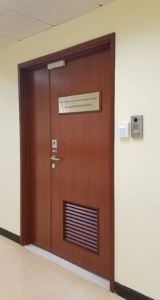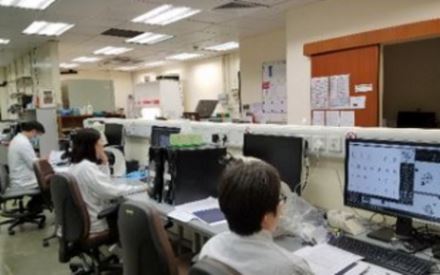Clinical Service:
An up-to-date and diversified range of services are provided through both general and specialized laboratories.
Rapid Response Laboratory and Hospital Blood Bank provide 24-hour urgent service for rapid testing on complete blood cell counts, coagulation screening and Type & Screen for blood transfusion.
Haematology Laboratory provides a comprehensive range of diagnostic tests for haematological disorders including flow cytometric assessment & detection of minimal residual disease of blood cancers; haemoglobinopathy screening & identification, coagulation factor & inhibitor assays and blood film review and bone marrow studies.
Blood Cancer Cytogenetics and Genomics Laboratory provides:
 |
 |
Conventional G-banding chromosomal analysis on metaphase cells by direct smear or synchronized cell culture of blood cancer cells as a global screening of any chromosomal gains, losses and rearrangements in clones and subclones. It furnishes a good overview of the gross genome status with valuable information for specific diagnosis like chronic myeloid leukemia, acute promyelocytic leukemia, myelodysplastic syndrome etc.
Conventional G-banding chromosomal analysis on metaphase cells by direct smear or synchronized cell culture of blood cancer cells as a global screening of any chromosomal gains, losses and rearrangements in clones and subclones. It furnishes a good overview of the gross genome status with valuable information for specific diagnosis like chronic myeloid leukemia, acute promyelocytic leukemia, myelodysplastic syndrome etc.
Fluorescence in-situ hybridization working on interphase cells and thus not dependent on the cell proliferativity. It is a good platform to supplement G-banding for specific detection of target lesion of interest for both diagnosis and prognosis. Regular panels are tested for the evaluation of chronic lymphocytic leukemia and plasma cell myeloma.
Minimal residual disease detection for acute lymphoblastic leukemia by PCR based on patient specific IgH/TcR rearrangements.
BCR-ABL monitoring using real time RT-PCR for chronic myeloid leukemia on tyrosine kinase inhibitor therapy
With advancement of more powerful platforms and the need for identification of multiple prognostic gene markers and therapeutic targets, molecular approach is now dictated by genomics where highly sensitive and specific detection of multiple genes are required to guide personalized clinical management. Migration to Next Generation Sequencing platform becomes a necessity, just like the coming in by smart phone.
Stem Cell Transplantation Laboratory:

Established since 1995 after the first successful allogeneic bone marrow transplantation for a girl with chronic myeloid leukaemia in 1991, sponsored by charity donation including MacDonald Funds, bone marrow transplantation laboratory strived to work on acquisition, manipulation and storage of donor stem cell products to support the treatment of paediatric blood cancer patients in the beginning and later on also thalassaemia major patients.
 The technical team worked exceptionally hard during SARS outbreak and performed many apheresis procedures to obtain convalescent serum from SARS recovered patients so as to treat prospective SARS patients (Soo et al, Clin Microbiol Infect. 2004). A historical time of territory-wide panic when all people were so afraid of potential SARS contact. The then Lab in-charge Dr. Kent Tsang was awarded SARS hero by the Government because of his selfless contribution. The Laboratory was relocated, expanded and renamed in 2019 to focus on adult blood cancer care and is prepared in collaboration with CUHK Medical Center to take on further challenges including CAR-T cell therapy to tackle on refractory blood cancers under the leadership of the University.
The technical team worked exceptionally hard during SARS outbreak and performed many apheresis procedures to obtain convalescent serum from SARS recovered patients so as to treat prospective SARS patients (Soo et al, Clin Microbiol Infect. 2004). A historical time of territory-wide panic when all people were so afraid of potential SARS contact. The then Lab in-charge Dr. Kent Tsang was awarded SARS hero by the Government because of his selfless contribution. The Laboratory was relocated, expanded and renamed in 2019 to focus on adult blood cancer care and is prepared in collaboration with CUHK Medical Center to take on further challenges including CAR-T cell therapy to tackle on refractory blood cancers under the leadership of the University.